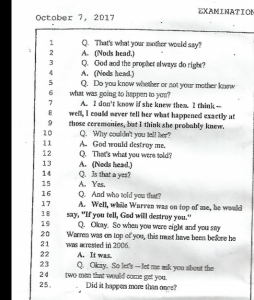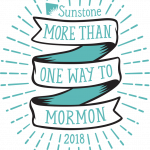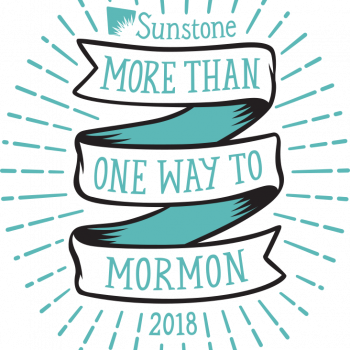**TW: This post contains strong themes of sexual and ecclesiastical abuse**
Several months ago I was leaked some pages from a devastating deposition that detailed some of the more heinous crimes of Warren Jeffs, current prophet of the FLDS group (a break-off sect of the LDS or Mormon church). I can say definitively that this was one of the worst things I have ever read. Words fail to describe what a horrific ordeal victims as young as 8 years-old had to endure in alleged “Wife Training” ceremonies.

From the age of 8 until 12, selected girls had a special assignment from their prophet. As much as five times a week, their mothers would brush and braid their hair, dress them, and load their daughters into the back of a black SUV sent by the FLDS leadership. Inside the car, a bag would placed over the child’s head until they arrived at the secret location where the trainings allegedly took place. The girl would go into a dressing room, strip down and then be escorted into a room of all white, where Jeffs and other prominent leaders waited, they too dressed in all-white. There the ceremony would begin. When it was over, the girl would be returned to her parents, sworn to never reveal what she had seen or heard. They would repeat again the next day until their twelfth birthday when they were eligible for marriage .
With all of the disturbing details of this story, I think the thing that haunts me most is the idea of a little girl getting ready in the morning with the help of her mother. It is not clear how much mothers knew about the abuse their daughters were enduring, but in my experience with the FLDS it’s likely they knew very little. They didn’t need to know, because they had trust and that was enough.
Trust in leadership is an important tenet of Mormon faith. It shows up in nearly every single sect that grew out of Brigham Young’s Mormon Saints. It’s “leaning not upon [our] own understanding,” that helps defines our faith. This trust in leadership can be conflated with trust in God. God calls (or ordains) leaders, therefore leaders are acting with God’s approval. If a Mormon leader tells us something that challenges us or causes concern, it is we that need to have more faith.
It is no surprise then that men like Warren Jeffs are able to get mothers to send their daughters off to such rituals. It is men like George A. Smith and John Doyle Lee who convinced regular fathers and sons to slaughter over 120 innocent immigrants. Questioning your leaders is not a sign of spiritual democracy in Mormonism, it can be a sign of weakness. While some prophets have tried to dissuade this thinking in the past, its a powerful cultural meme within Mormon groups.
As a side note, whenever I compare the FLDS to the LDS, it inevitably arouses an eye-roll or two from a Mormon academic. The comparison is Mormonism’s Godwin’s Law and sometimes an excuse for angry Mormons to take a swing at the church. Go to any exMormon forum and you will see someone inevitably compare Joseph Smith (Mormonism’s founder) to Warren Jeffs. While it can be flippant and lazy to draw such comparisons, it would also be irresponsible to not honor the similarities. (I work directly with the FLDS and other fundamentalist groups and the LDS reticence to acknowledge these groups add complicity to their isolation that facilitates abuse).
As an LDS woman, I was shocked to read the latest Mormon Leaks release about former MTC (Missionary Training Center) President, Joseph L. Bishop abusing young women he was in a position of authority over. The leak details a tape of Bishop admitting to “molesting” women and having “addictions.” Bishop not only served in the lead position at the MTC, but he served as a mission president in Latin America, was a church published author, and employed as an administrator at Weber State University. He had a wide net of access to young women under his stewardship.
This isn’t the only time a prominent LDS leader has used their position of power to access to victims. While the issue of ecclesiastical abuse certainly isn’t exclusive to Mormonism, abuse in the Mormon community usually plays out in a very Mormon way.
And this is where I think the comparisons between LDS and FLDS work responsibly. LDS are quick to point fingers of abuse at the FLDS and distance themselves from the sect. It is true that the levels of abuse are different, but the way the abuse is mechanized in both groups is the same.
Here are some of the same ways predators are able to gain access in both denominations:
- FLDS parents trust their leaders to do right and thus they trust their kids to the church.
- LDS parents trust their leaders to do right and thus they trust their kids to the church.
- FLDS parents trust their leaders to interview children, including deeply personal questions about masturbation, sex, and bodies.
- LDS parents trust their leaders to interview children, including deeply personal questions about masturbation, sex, and bodies.
- FLDS parents trust their leaders to do what’s best for their children, allowing them to ride alone in cars together, sit alone in an office together, and even travel to church activities together.
- LDS parents do the same.
These are only some of the ways that both FLDS and LDS both share ways that can enable ecclesiastical abuse. Both groups too, believe that women (and their wombs) are the keys to heaven for men. Both groups believe that women should covenant “unto” their husbands, as an intermediary before God. Both groups rarely (if ever) use clinical terms to describe body parts or teach comprehensive sex education to their followers. Both groups believe that men and women (who are not married) being alone together is sinful. Both groups focus heavily on chastity, virtue, and modesty (although each group draws varying fashion lines). Both groups believe purity is tied to virginity and sexuality. And both groups believe that men (usually with no clinical training and education) have the power and authority to instruct children about these issues.
I will leave with one more comparison that finds me chilled as I process the information on the Mormon Leaks tape.
After hearing the tape, my initial response was horror, followed by a more disturbing thought: Obedience- and not in the spiritual sense, in the institutional one.
Because I work in Mormon communities, it’s impossible for me to escape this news and I considered sharing it on Facebook. I did so with caution and trepidation. Why was I so hesitant? Because in Mormonism, in both the LDS and FLDS we are to never speak ill of our leaders. Anything negative, especially crimes like those alleged in the tape, can make our group look bad. Anything that isn’t ardent praise can be seen as criticism and disloyalty. It would be better to be a sinner in the church than to be disloyal. The narrative we tell at church is one where we don’t want to talk about, nor think about the messier aspect of ourselves.
The reality is that abuse exists in both the LDS and FLDS and while the abuse isn’t always the same, the attitudes surrounding it are. Those attitudes tell us to ignore, to dismiss, and to disbelieve stories that shine a light on the ugly things. I found the ghost of that rhetoric haunting me today as I talked about the leak online. Almost immediately, several people on Facebook unfriended me. My reaction was to feel shame and traitorous. We have a word for this in both the LDS and FLDS. It’s called, “apostate.”
I am left sad and angry that even our cultural attitudes about dissent can enable and protect abusers. I am left angry that my own LDS people would rather look at the abuse in other groups before getting their own houses in order, and I’m left upset that talking about this leaves so much personal risk, trauma, and fall-out for victims.
If you are a Mormon and reading about it makes you uncomfortable, ask yourselves “Why?”
Does listening to the tape make you feel empathy for the victim or the church? And if you do indeed empathize with the victim, perhaps it is a Godwin’s mirror to look in, but it’s one that we need to see ourselves reflected in. We need an honest, hard look in this mirror if we want to not implicate ourselves in the silent truth that there are predators among the Saints. Even among our Saints.












